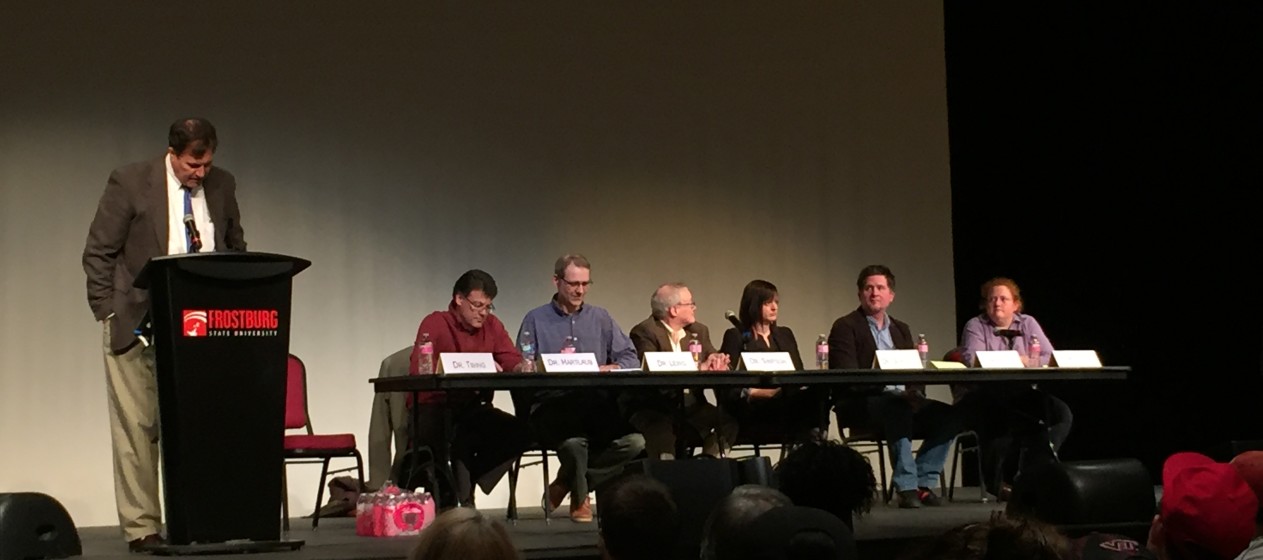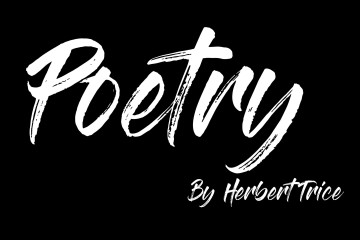Presidential Election Panel Held by FSU Faculty
Political Science, History Professors Provide Remarks
On Tuesday, September 11, faculty from the political science and history departments at Frostburg State University came together to provide remarks on the current U.S. presidential election. Together, the faculty gave historical and cultural context to the current contest, providing scope to the candidacies and the impending decision. A question and answer period followed the remarks, held in the Alice R. Manicur Assembly Hall of the Lane University Center.
Chair of the political science department Dr. Stephen Twing moderated the evening. Beginning the dialogue was history professor Dr. Eleanor McConnell. McConnell spoke on the presidency and legacy of America’s seventh president, Andrew Jackson. Similarities exist, McConnell posited, between the support predominantly white men provided Jackson and the support white men provide GOP presidential candidate Donald Trump today. Both candidates, McConnell argued, appealed to a certain notion of extreme populism. Larger parallels can be drawn concerning xenophobia present within the Jackson and Trump candidacies – targeting Native Americans and immigrants, respectively.
History professor Greg Wood provided remarks on the use of media in elections, drawing parallels between current conservative talk radio pundits like Glenn Beck to historical radio figures of the early 20th Century. Conservative attempts to reach base voters through mass media are not new, Wood argued, and such efforts have been known to galvanize conservative voters across the country.
Dr. Natalie Schuster, history professor, lectured on the evolution of political parties, zeroing in on the loss of the ‘Dixiecrats’ in the southeastern states during the 1960’s. The adoption of the southern states by the GOP has led to a tried and true method none as the “southern strategy.” However, Schuster noted, it is becoming increasingly hard for Republicans to rely on this strategy in obtaining the White House. With Virginia becoming more and more blue and the Republican electoral path narrowing, the southern strategy’s efficiency may have reached a peak in light of the 2012 GOP autopsy report.
Political science professor and 12-year FSU provost Dr. Steve Simpson provided additional remarks on the media, examining the effect of the 24-hour news cycle. The increase in television coverage of politics, as well as television channels, Simpson argued, has allowed the American public to select news outlets that conform to their own idealogical biases. So much, in fact, that Americans now view objective reporting as biased against their own views. Additionally, Simpson argued, an increase in competition and demands for ratings has contributed to an increase in horse race coverage, including emphasize on polling. Polling, Simpson stated, must be taken with a grain of salt. The average margin of error for a presidential poll is typically three points. Any polls within this margin of error tell us statistically nothing. Rather, Simpson argued, a margin of five points is usually required to display statistical significance.
David Lewis, political science faculty member, spoke on the consequences of the impending election on the Supreme Court, noting that an already vacant seat will be filled by the 2016 victor. Additionally, Lewis stated, the liberal Ruth Bader Ginsburg, who will turn 84 two months after the presidential inauguration, could vacate her seat on the court within the next presidency. In the event of a Trump presidency, the Supreme Court would likely grow to include at least two more justices akin to the late Antonin Scalia, whose bitingly conservative views were made known throughout his 30 years on the Court. A Clinton presidency, on the other hand, could see the most liberal court since the 1960’s. Lewis noted, however, the potential problems associated with a Clinton presidency in Congress. A Hillary Clinton presidency, he stated, would likely not be gifted with a honeymoon period in the legislature. In the event of a Clinton victory and GOP retention of Congress, President Clinton would likely have to engage in heavy usage of executive orders. Lewis predicted that Clinton will embrace this aggressive executive style and foresees her administration appearing in court frequently.
The last speaker, Dr. Stephen Hartlaub of the political science department, outlined techniques utilized by those in power to oppress voting populations. Pulling from Aristotelian theories, Hartlaub outlined how poverty, indulgence, and other distractions can allow political leaders to govern without popular accountability.
Questions from the audience were answered by the panelists, with both students and community members providing additional talking points.
The last day to register to vote in the state of Maryland is October 18. The next President of the United States will be elected on November 8, 2016.
Featured image: (Nick DeMichele/TBL)




